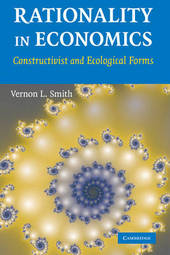
|
Rationality in Economics: Constructivist and Ecological Forms
Hardback
Main Details
| Title |
Rationality in Economics: Constructivist and Ecological Forms
|
| Authors and Contributors |
By (author) Vernon L. Smith
|
| Physical Properties |
| Format:Hardback | | Pages:388 | | Dimensions(mm): Height 233,Width 162 |
|
| Category/Genre | Economics
Economic theory and philosophy |
|---|
| ISBN/Barcode |
9780521871358
|
| Classifications | Dewey:330.01 |
|---|
| Audience | | Professional & Vocational | |
|---|
| Illustrations |
10 Tables, unspecified
|
|
Publishing Details |
| Publisher |
Cambridge University Press
|
| Imprint |
Cambridge University Press
|
| Publication Date |
5 November 2007 |
| Publication Country |
United Kingdom
|
Description
The principal findings of experimental economics are that impersonal exchange in markets converges in repeated interaction to the equilibrium states implied by economic theory, under information conditions far weaker than specified in the theory. In personal, social, and economic exchange, as studied in two-person games, cooperation exceeds the prediction of traditional game theory. This book relates these two findings to field studies and applications and integrates them with the main themes of the Scottish Enlightenment and with the thoughts of F. A. Hayek: through emergent socio-economic institutions and cultural norms, people achieve ends that are unintended and poorly understood. In cultural changes, the role of constructivism, or reason, is to provide variation, and the role of ecological processes is to select the norms and institutions that serve the fitness needs of societies.
Author Biography
Vernon L. Smith was awarded the Nobel Prize in Economic Science in 2002 for having established laboratory experiments as a tool in empirical economic analysis, especially in the study of alternative market mechanisms. He is currently Professor of Economics and Law at George Mason University and a Research Scholar in the Interdisciplinary Center for Economic Science in Arlington, VA. Professor Smith is the President of the International Foundation for Research in Experimental Economics, which he helped found in 1997 to support education and research in experimental economics. He has authored or co-authored over 250 articles on capital theory, finance, natural resource economics, and experimental economics. Cambridge University Press published a first collection of essays under the title Papers in Experimental Economics in 1991, and published a second collection of his more recent papers, Bargaining and Market Behavior, in 2000. Professor Smith is a Fellow of the Econometric Society, the American Association for the Advancement of Science, the American Academy of Arts and Sciences, and in 1995 was elected a member of the National Academy of Science. He received an honorary Doctor of Management degree from Purdue University, an honorary Doctorate from George Mason University, as well as from universities in other countries. Professor Smith's current experimental research involves property right rules for using auction markets for regulating pipeline joint ventures, anti-trust implications of bundled pricing of commodities, compensation elections for protecting minorities in majority rule democracies, and demand response and active retail choice in electricity pricing.
Reviews'The journey that brought Vernon Smith to his Nobel Prize is not over. It obviously brought us constructive tools, in the form of controlled experimental methods that allow economists to see the lay of the behavioral land more clearly than before. But this magisterial review of the whole journey, including precursors, reminds us that the scope of economics has always been much wider than the straw man that behaviorists like to attack. Properly understood, experimental methods force all economists to think of constructivist and ecological rationality as complementary ways of understanding behavior, rather than as fundamentally inconsistent views of behavior. The journey, then, has really just begun.' Glenn W. Harrison, College of Business Administration, University of Central Florida 'Vernon Smith has spent a lifetime of research, combining theory and experimental evidence, exploring the idea and implications of rationality in economics. This book recounts that lifetime, synthesizes it and adds to it - producing a volume that soars above the usual material of economics. The end-product is a volume that takes an eagle's eye view of rationality in economics, and puts it in a new and glorious perspective. Reading it is essential for theorists and practitioners.' John D. Hey, University of York, UK and LUISS, Italy 'Rationality in Economics is a delight, garnished with fascinating historical detail, philosophical scientific insights, and an eye on current public policy issues. Vernon Smith, as always, shows a skeptical, irreverent attitude toward 'rationality models' based on assumptions that are not stress-tested with cash-motivated subjects in the lab. His own policy recommendations, like the 'Combinatorial Clock Auction', are original and innovative.' Charles Holt, University of Virginia 'Locating human sociality as a centerpiece of economics, Smith's clear vision of the meaning of rationality pierces the fog surrounding the place of economics in human society. Ideas of David Hume, Adam Smith, Friedrich Hayek and Herbert Simon are masterfully synthesized with fifty years of experimental data from the economics laboratory to bring us a book that might as well be called 'The Origin of Human Institutions'.' Shyam Sunder, School of Management, Yale University 'I am pleased to report that Vernon Smith's new volume of opinions amounts to the most important book on economic methodology of the past decade.' Journal of Economics and Philosophy '... a rich book that is full of stimulating ideas ...' History of Economic Ideas
|